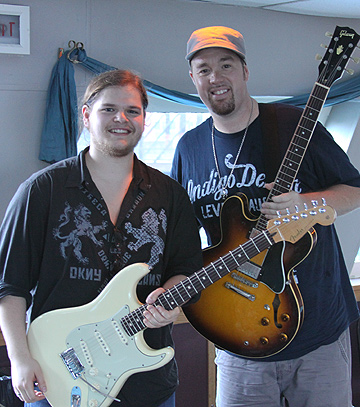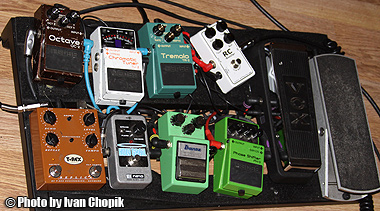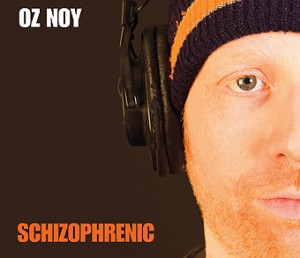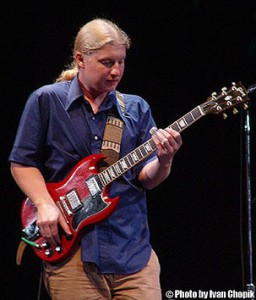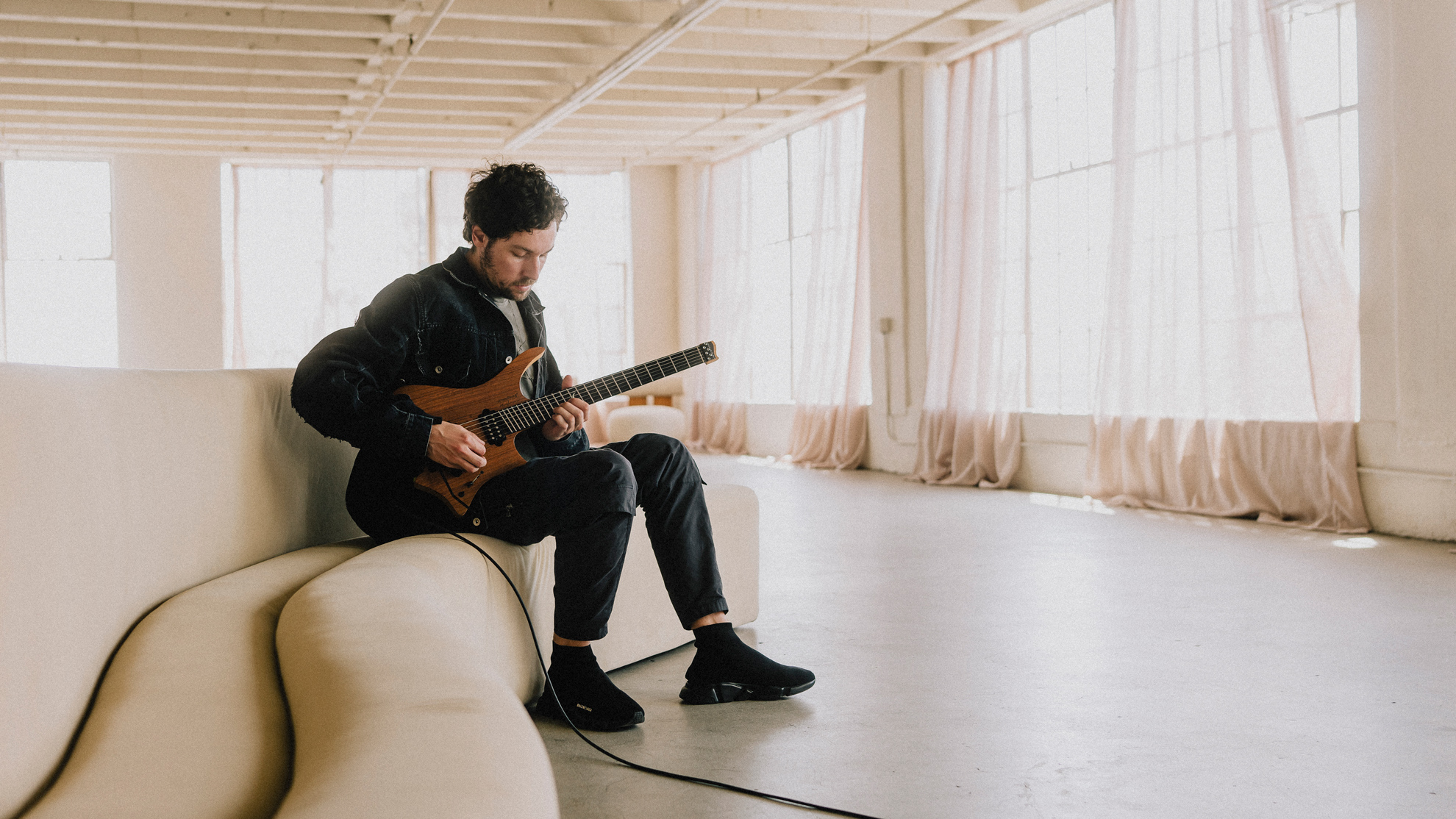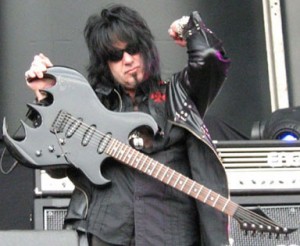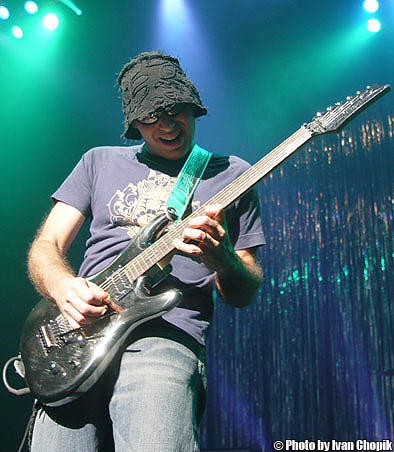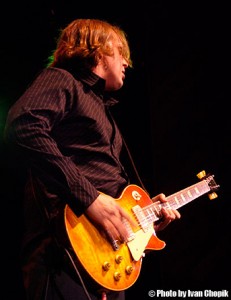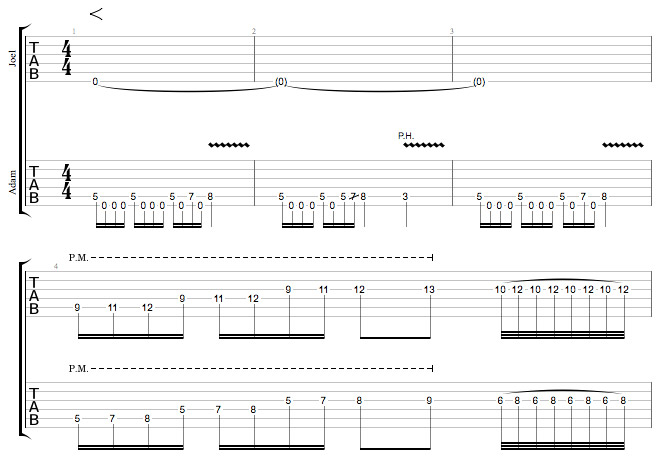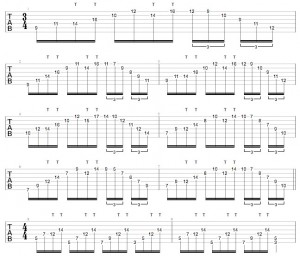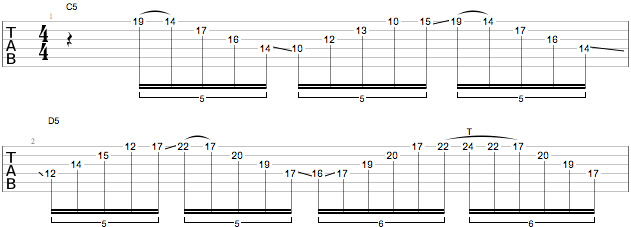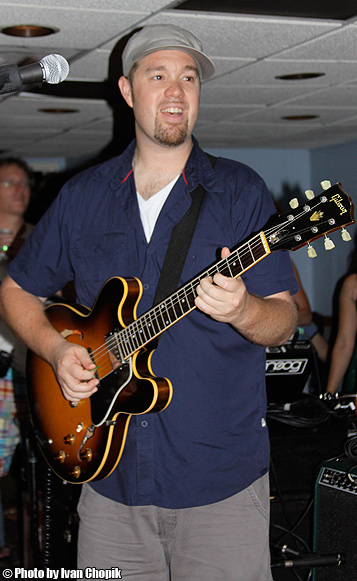 An acclaimed musician in today’s jazz, hip-hop, and funk circuits, Eric Krasno is best known as the guitarist and co-founder of the soul-funk powerhouse Soulive. With his deep groove, bluesy attitude and jazz chops, Kraz’s signature sound stands out throughout all of his work.
An acclaimed musician in today’s jazz, hip-hop, and funk circuits, Eric Krasno is best known as the guitarist and co-founder of the soul-funk powerhouse Soulive. With his deep groove, bluesy attitude and jazz chops, Kraz’s signature sound stands out throughout all of his work.
Kraz is also a founder of Lettuce and is currently on the road with his band Chapter 2 in support of his debut solo album Reminisce, which was released on Soulive’s newly established label, Royal Family Records. In the production world, Eric Krasno works with collaborator Adam Deitch as Fyre Dept, a project which has provided tracks for artists such as Talib Kweli and 50 Cent. I recently had the opportunity to speak with Kraz during the Reminisce tour with Chapter 2 – a unique gig that took place on a boat off the shore of Boston, MA:
IC: What’s going on with you right now? You’ve got a lot of stuff happening.
EK: I’ve been really busy. I’m part of Soulive, also Lettuce, and now we’re out on the road with Chapter 2. Also, I’m supporting my new album called Reminisce. I put that out in April, and it’s one of the first releases on our new record label called Royal Family Records – and we have royalfamilyrecords.com, which is kind of like an interactive site we’ve been developing to keep people informed on what we’re doing.
I’ve also been producing quite a bit with Adam Deitch [drums], who also plays in Chapter 2. We have a production team called Fyre Dept, so we’re working with different artists from hip hop to dance hall to pop, and anywhere in between.
IC: Can you tell me a little bit about how Reminisce came together and what led up to the making of that album?
EK: I wanted to do a solo record for a while, and in 2006 I started recording a bunch of tunes. Originally I was doing more vocal stuff, and then when I met Nigel [Hall, vocals and keyboards], we started working on his record – so basically of the original sessions, some of the songs went toward what was gonna be Nigel Hall’s album, and more of the instrumental stuff went as the bulk of my album. Then over the next couple years I added a few tracks, and I was gonna release it a lot earlier, but different label things happened and once we started our own label it just made sense and the timing was right.
I got to work with a few different people – Adam was kinda like my copilot. He played on most of it. Nigel played on a lot of the later stuff. I played bass on a lot of the original tracks, but then on a lot of the later stuff Louis Cato played on, [and] Nigel actually played bass on a track. I got some horns from Ryan Zoidis, who plays with Lettuce, so it was a lot of the usual suspects that we work with.
IC: What was the inspiration behind the name Reminisce? I know you’ve got at least two cover songs on there.
EK: That was part of it. As the album started coming together, I started seeing it really as a retrospective of all the different styles that kind of influenced me, and my take on those things. Because growing up, I listened to a lot of different guitarists and a lot of different people that influenced me, so you can hear that directly in a lot of the different songs, and it’s kind of like my ode to different eras of guitar playing that I love.
IC: I notice much more of a rock influence on this one than in your other releases.
EK: Yeah, that’s what I grew up on. I grew up on Led Zeppelin and Jimi Hendrix. So I let that be known on this a little bit more – and you’ll definitely hear more of that with Chapter 2. It’s definitely seeped in funk and groove, but there’s a lot of rock influences in what we’re doing.
| [flashvideo file=”https://guitarmessenger.com/wp-content/uploads/2010/07/erickrasno-interview.flv” width=450 height=273 image=”https://guitarmessenger.com/wp-content/uploads/2010/07/krasno_video.jpg” /] |
IC: You have so much material to pick from when you play live now, and I understand that for a lot of what you do there’s no set list, so you guys just kind of feel it out.
EK: Yeah, we’ll try to write out a bunch of songs to choose from. We’ll take that as kind of a guide, and we’ll throw in different things as we go. That’s the great thing about working with such top-notch musicians – that we can kind of go anywhere.
Last night we threw in songs we’ve never played before together, and I love that. I love the excitement of a spontaneous idea – as much as we can do that, we try to. We try to keep it as tight as possible at the same time.
IC: What’s some of your favorite material to play live out of all the stuff you have?
EK: I love the Lettuce tunes. I love playing with horns, and we’ve even been interpreting some of those tunes with Chapter 2 – which is different without the horns, but I think they have a strong groove, so it’s cool to play that stuff. The thing that I love is playing different music and changing it up, so that’s what’s great about having different bands and different projects, because I get to play different music on different days of the week. I may have a Soulive gig one day, and the next day I’ll be playing Lettuce and Chapter 2, or in the studio. The night before last we were performing with Chapter 2 and John Scofield, and then that night we were in the studio with Talib Kweli and a bunch of other people – so I feel blessed to work with different types of artists that are of that caliber. I feel very fortunate.
IC: Between all the bands, the production company, and the label, how do you keep it all together? How do you manage that?
EK: It’s not totally easy. It’s a lot of work, not too much sleep, but I have a lot of great people that I work with. Velour Music is our management team, and we have a great team of people. Royal Family has a bunch of great people working with us, so it’s a collective effort for sure.
IC: You seem to really encompass the idea of the modern musician in the sense that you have all these avenues that you’re following, and collectively that’s what makes up your career. I feel like more and more for musicians, that’s becoming the path they need to take. What do you feel, out of all of those things that you’re doing, is the most rewarding part of your career?
EK: It’s hard to say – it’s really hard to say because one day I get to be out on the road playing in front of a lot of people, and then another day I get to be in the studio making records. I know a lot of people that are only on the road or only making records, and for me, I crave both. When I’m on the road for three weeks, there’s nothing I wanna do but get in the studio and make some new music and create.
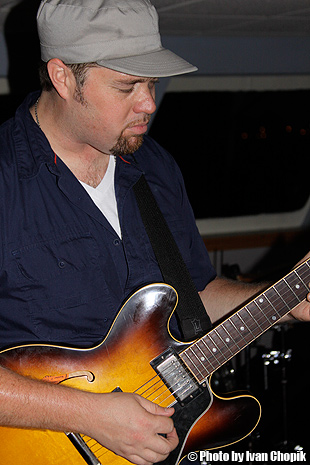
And same when I’m in the studio for more than a couple weeks – I want to get out and play with people because I want that interaction and I want to improvise. So I think what I’m most happy about is that I get to do both, and get to do them with great people – and sometimes get paid for it [laughs]. Hopefully more times than not.
IC: So you’re kind of on both ends of the spectrum of analog and digital – your band is playing [live music], and then you are producing tracks. How’d you get into that side of things, and how’d you get started with production?
EK: You know, I started kinda early on. I was into samplers. I got an ASR-10 – Adam Deitch actually had an ASR-10, and I ran with it and I got one. I was always doing stuff with loop pedals even before then, where I would loop stuff and play with it. I met a bunch of singers and rappers at various times in Boston, and they started coming to me for music, and I fell into it that way. I started making tracks with people.
I used to live in Jamaica Plains with a guy named Jeff Bhasker, and he and I had a studio there, and we used to develop songs and tracks together. He’s doing really well as a producer – he did a lot with Alicia Keys and Kanye West and all this stuff. So it’s really great to see all these people that we came up with [doing well].
I was around all these great influences, and I learned from them and took those things and put it together, and it’s cool. Now I can travel around with a laptop and be creating music, which is pretty amazing, and it’s not as limited. It used to be limited to a certain amount of sounds you could use, but the palette is so big now. The technology is advancing. I mean, I’m making music on my iPad right now on the way up here in the van. So all of that’s evolving. The main thing is to know that playing real instruments has gotta stay alive, and there’s nothing quite like that. I use those digital things to create ideas, but it’s all about fusing that with what I call ‘real music’ [laughs].
I’m really into computers, and I’m into technology, so it’s just a different side of the brain, you know? But if you can merge those together, that’s the ultimate. Our goal is to put real, organic, soulful music back in the mainstream – and that’s all changing anyway. The mainstream is kind of going away and the radio stations are kinda dying out. I mean, so much of it is online presence and giving away music, unfortunately. We don’t wanna do that, but that’s kinda where it is. If you give away really good music, people will come support you in other ways – live shows, and whatever other things you can offer with that, so we’re messing around with all different types of ideas to get our music out there.
IC: Now that you’ve taken this natural step to put everything under one roof with Royal Family Records, how has that changed putting out music for you?
EK: Well, it’s changed in that we can do it quicker. We’re making music all the time and what our goal is – and I wouldn’t say we’ve quite reached it yet – but we’re trying to get to the point where, when we’re in the studio, you can have access to what we’re making the next day. It would be really cool to be able to put out singles instantly, and also have more interaction with people – like when we’re in the studio, we wanna start doing live streaming of our sessions and be able to do even online lessons or work with people.
There’s so many doors opening now with that so we’re trying to be on the cutting edge of that, as much as we can be, utilizing technology to the fullest to get music out there, because we haven’t quite all figured out how to turn the internet thing into dollars, besides promoting shows and stuff like that.
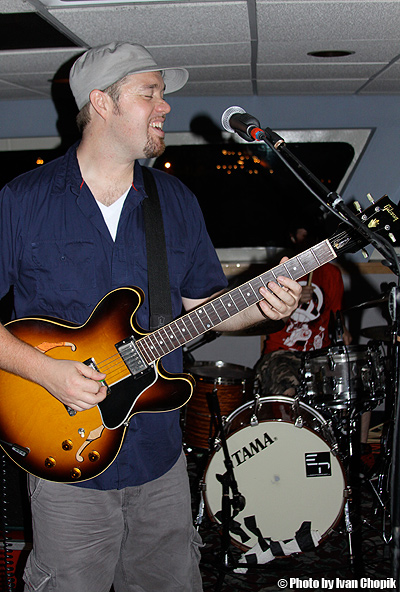
But I think if we just keep making good music, and making it accessible, that that will come together. People think I’m crazy, but I have faith in that, and I think that if we make great music and we get it out to people, that they’ll support us.
IC: Absolutely. It’s kinda interesting to think about releasing music quicker like you mentioned, because I feel like it’s coming around in a big circle.
EK: Yeah like singles, like 45s.
IC: Yeah, those things used to come out really quickly.
EK: Yeah, I remember reading the Fred Wesley book – who’s a guy that we’ve worked with some, who’s a huge hero of mine. He used to tell me that they would make singles with James Brown, and they would go out a week later on tour, and people would know all the words, because they would take that single, they’d send it to the radio stations, and that was all they had – those few radio stations that played that style of music.
It’s different now that you have so many options online, so that’s what one of the things that Royal Family is working towards – a place you go, and you know it’s gonna be good music. And we’re gonna start including not just our crew, but all the people we associate with, whether it’s Derek Trucks or John Scofield or whoever we’ve been working with at that time. We can include them and bring them into jam sessions, as a portal to get their music out, too. We’ve got a little ways to go, but we have a lot of goals that we wanna reach.
IC: Do you have a home studio these days?
EK: Yeah, well Adam and I have a studio in Brooklyn. Then I have just a small setup in my house. I just got Logic – I’ve had Pro Tools there for a while and I just got into Logic. I have a few guitars there, but I spend a lot of time at our studio, and Alan [Evans, drums] from Soulive has a larger studio in Western Massachusetts – it’s like a big barn more for live band full-on stuff.
Our Brooklyn studio is cool – it’s a little smaller, good for production stuff. We can do live stuff there, but it’s more geared towards production, and we’ve been doing stuff for TV and film and stuff like that, too. It’s kind of a hybrid between digital and analog.
IC: What’s going on with Fyre Dept right now? What’s the latest project?
EK: We’re actually just right in the middle of doing a mix tape. It’s our first, called The Lost Files, and basically we had tons of tracks that had never come out and some of them were on hard drives that had been lost or broken, and I was like: ‘You know what? That stuff’s there, we have versions of it, let’s just get it out there.’ Originally we were just gonna do it all instrumental, and then we were in the studio with Kweli, and he heard it, and he was like: ‘Let me get on that!’ So he did this intro, and then he did a verse on another, and then we just started thinking: ‘Well, let’s just start reaching out to people to get on it.’ We’re gonna give it away, that’s the whole concept – just to kind of create a new buzz, cause Fyre Dept’s never really put out our own music, we’ve always produced for other people.
So that’s what’s going on now, and I’ve been putting out a lot of different calls to get people to rap on it or sing on it, and so it’s gonna be literally a mix tape. It’s not gonna be based on making hit songs. This is gonna be about getting different people to express what they feel over this backdrop of music. A lot of it was Deitch’s brainchild. He was in the studio coming up with all these beats and found some ways to blend them together, and then I came in and added some live stuff to that, and then now we’ve just been thinking about concepts of which songs [to pick with] which people on what track. That’s where we’re at now.
IC: Can you tell us about your rig now? What’s your live rig like?
EK: You know what, I just picked up an amp on the way here, 20 minutes ago that I’m playing for the first time. I had bought a Fender ‘65 Reissue Twin about ten years ago. I used it for a month, and it broke. Every time I’d be at Alan’s studio, I’d see it there, and I’m like: ‘I gotta do something with that,’ and our engineer, who we’ve been working with for the last six months or so, he builds amps, and he was like: ‘I will make that thing so incredible,’ so he took it from me, and had it for the last couple months, and he rebuilt the entire thing.
There’s nothing original in it, so he rebuilt the entire amp, put green tolex on it. It’s green with a black grill. So I’m about to play that for the first time. But for the last few years, pretty much, I’ve been using a Mesa Boogie Lone Star. I have a really beautiful one that they made me, with a custom maple shell, and then I’m renting gear a lot, so whenever that’s available, that’s what I use – a Lone Star.
IC: What’s on your pedalboard these days?
EK: That changes a lot. I’ve got a small one with me now that’s got an Xotic RC Booster that I use a lot. It’s got a cool EQ on it. Dave Koltai and Pigtronix, his company – he makes a lot of cool stuff for me. He makes a really cool preamp pedal. Unfortunately he’s actually fixing it right now, so I replaced it with this RC Booster one, but I always bring that with me everywhere. Even if I’m sitting in, I try to bring that because it’s a great sounding pedal. And we’re working on developing that into maybe a signature pedal, we’ll see.
On my small board, I have a few Boss things, because they’re really sturdy, and they’re small, so I have the octave, which I dig, I have the tremolo, and then a phase. Then I have a volume pedal, which I try to have all the time, and then a Vox Wah, which I swear by. I pretty much always use those. I’ve got a really cool delay, a T-Rex Replica it’s called. That was Ian Neville’s, and I’ve been borrowing it for like a year, so I need to get it back to him, but I’ve been really digging that thing. It’s really cool, because it’s kinda got that analog sound, but it also has a tap thing on it, so I can control it. I really dig that one. I also use the Echolution made by Pigtronix. That’s the main stuff, and then I have a Tube Screamer.
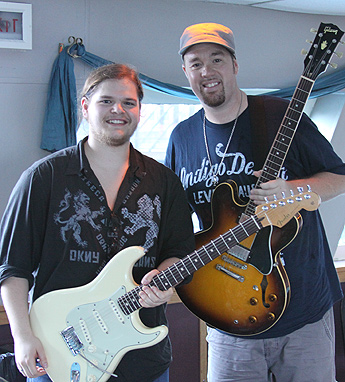
Eric Krasno and Ivan Chopik
IC: On Reminisce, I’m hearing a couple of different guitar tones.
EK: Yeah, I have a ’78 Strat that I used quite a bit on there. Then I’m using my Ibanez AS200. Today I’m using this 335, and I use that on there a little bit too. And then I have a George Benson Ibanez with flatwounds on it, for more of the jazz tone.
IC: Soulive has been around for 10 years now – what do you see in the next ten years?
EK: You know, we’ve come from riding around, carrying organs all over the place, and now we have our own label and stuff, so I just wanna see Soulive and Royal Family grow. We have so many goals. We wanna keep making Soulive records until we can’t play anymore. That’s family, and we’ll be playing together forever.
We have a bunch of cool projects in mind. You know it’s funny, it’s hard to just pick one and figure out when to do it, but we’re about to release an album called Rubber Soulive, which is all Beatles covers – organ trio versions of Beatles tunes, all instrumental. So that might even launch a whole series, because after we did that, we were like: ‘Oh, we gotta do Zeppelin.’
IC: I would love to hear you guys do Zeppelin.
EK: Yeah, I would love that. So maybe that’ll be next. We’ve also been talking about flippin’ up old 80’s tunes into soul renditions of 80’s tunes, which is another crazy idea that could be fun. Don’t steal that idea, anybody out there [laughs]. We also recently produced Nigel’s solo album, but we also wanna do a collaborative album with Nigel. We’ve got a lot on the horizon. It’s just about finding the time to get it all done.
IC: What’s your advice to up and coming musicians trying to make their mark in the industry?
EK: I think the main thing is to be true to what you love. You gotta make music that you would love to listen to. Don’t make music for money. You’ll be a lot happier making music that you love, and it’ll be a lot better for music to have more and more people doing original stuff and stretching and expanding music as we know it. That’s the job of young people. I think it’s important to make music that you would wanna hear and that you love, and to create your own voice.



